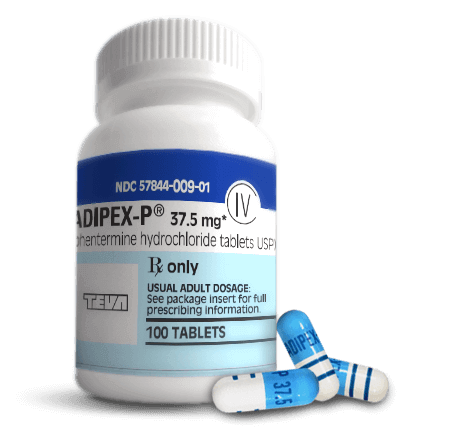Phentermine: Safe & Effective Weight Loss for 60 Years
The FDA approved phentermine appetite suppressants in 1959. This is a very long time for any medication. With over 50 million prescriptions written over the past 60 years in the US alone, it has proven to be a safe and effective weight loss medication. Contrary to popular advice from those who are not medical professionals, blood pressure and heart rate are not affected.
Brand names for phentermine are Adipex-P® and Lomaira. Discontinued brands in the US include Fastin and Ionamin. Adipex-P is a longer-acting version taken in the morning. Lomaira is a short-acting version that one can take 30 minutes before meals. Phentermine is also available under its generic name.
Phentermine Helps You Lose Weight
I prescribe phentermine to many of my overweight and obese patients based on their medical history, metabolism, and weight loss needs. When given to the appropriate patient, there is steady, predictable weight loss of 2-3 lbs. per week. Depending upon the age, gender, and starting weight of the patient, weekly weight loss can be even higher. Furthermore, this happens without any significant side effects. In fact, the only side effects I see are dry mouth and a little bit of insomnia. We eliminate the latter by taking the medication earlier in the day and avoiding caffeine after lunch.
Phentermine and the other appetite suppressants remain very effective. As a result, they play a major role in helping overweight individuals lose weight when taken in low doses and titrated slowly over time. Tens of millions of people have taken these medications over the past 60 years without any problems.
How Does Phentermine Work?
Phentermine is a sympathomimetic amine, also known as an “anorectic” or “anorexigenic” drug. According to the National Library of Medicine, phentermine’s primary mode of action is that it increases the body’s release of catecholamines. Specifically, it causes the release of epinephrine and norepinephrine, and possibly dopamine as well.
These catecholamines cause a decrease in appetite and an increase in energy expenditure by their influence on a variety of neurotransmitters and neuropeptides throughout the hypothalmus. When you are taking phentermine, you tend to feel less hungry but more energetic and alert. Increased energy expenditure will burn more calories. Weight loss results from a combination of these influences.
How Effective is Phentermine?
There have been over 100 clinical studies on phentermine reported in the various medical journals.
UK Weight Loss Study:
A British study found phentermine to be effective when compared to placebo over a period of months. This study included three groups of 36 women each. Two groups took phentermine to augment their weight loss efforts. In one group, doctors gave participants 15 mg per day for the duration of the study. In another group, doctors gave participants the same dose every other month. Both groups consumed a 1,000-calorie daily diet. The continuous group lost a total of 27 lbs. over the period, and the intermittent group lost slightly more at 28.7 lbs. Few if any side effects were noted. Furthermore, there were NO significant differences in systolic and diastolic blood pressure between the groups.
Recent South Korean Study:
In 2005, Korean scientists conducted a trial of this medication’s weight loss effects on 34 participants. In this study, they used the standard 37.5mg dose. Subjects were placed on a 1,500 calorie per day diet. After 14 weeks of study, the drug treatment group lost 16.5 lbs. Side effects reported in this study, similar to many other studies, were much less significant than most people think. Here is the report on side effects from the study:
“… in adverse events analysis, only 6 of 29 (20.7%) treatment group subjects had complaints about palpitations. This number is not significantly more than the placebo group. Similarly, blood pressure had not increased after the treatment period in phentermine group, and there were no significant differences between both groups. The analysis of blood pressure at the 6th week found the mean systolic pressure to be 127.4 (SD 10.2) mmHg and the mean diastolic pressure was 85.1 (SD 8.4) mmHg in the treatment group (n = 28), compared to systolic 127.3 (SD 12.7) mmHg and diastolic 83.5 (SD 10.4) mmHg in placebo group (n = 24). Therefore, we can suggest that the administration of phentermine would not induce any serious cardiovascular effect at least for the patients whose risk of cardiovascular disease is not high.”
Phentermine typically has very little effect on blood pressure or heart rate. In low doses, most people experience virtually no effect on blood pressure, heart rate and even sleep.
What are the Side Effects of Phentermine?
The most common side effects reported in clinical trials were dry mouth, dizziness, insomnia, restlessness, irritability, nausea, vomiting, diarrhea, and constipation. Many of these side effects go away as we adjust to a dose that works for you and your body adjusts to the medication.
Is this Fen-Phen?
No. The old combination of phentermine and fenfluramine or dexfenfluramine caused heart valve disease due to the fenfluramine or dexfenfluramine component. In 1997, manufacturers withdrew it from the market at the request of the FDA.
Who Can Take Phentermine?
This medication is the most effective as part of a treatment plan that includes exercise, behavioral changes, and a low-calorie diet. We recommend it for people with a body mass index ≥ 30 kg/m2 or a body mass index ≥ 27 kg/m2 with medical issues such as diabetes and high cholesterol.
People with the following medical conditions should NOT take phentermine:
- A history of cardiovascular disease (hardening of the arteries, stroke, congestive heart failure, and/or moderate to severe high blood pressure)
- Overactive thyroid
- Glaucoma
- Renal impairment
- Hypersensitivity to stimulants
- People with a history of drug abuse or mental illness
- Women who are pregnant or nursing
- Anyone who is currently taking or has used a monoamine oxidase inhibitor drug (MAOI) within the past 14 days
Each individual needs to discuss the use of these medications with their personal physician to see which medications will be safe and effective.
Call 305-670-3259 to make an appointment with Dr. Lipman in his Miami office and see if phentermine is right for you.




